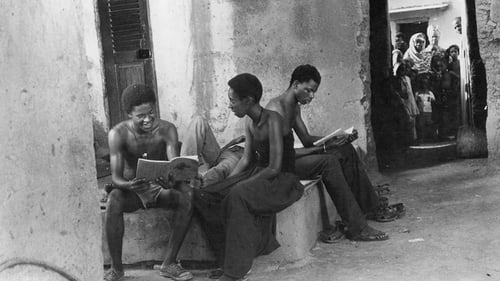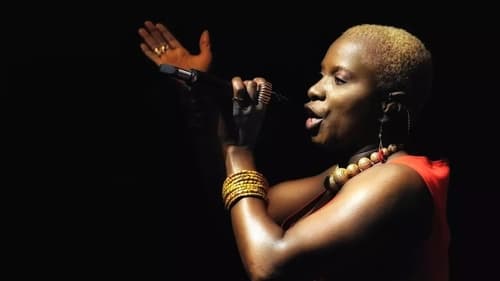
Caught in the stranglehold of debt and structural adjustment, Africa is fighting for its survival. In the face of disaster, representatives of African society bring an action against international financial institutions. The trial takes place in Bamako, in the yard of a house, among its inhabitants.

When Lena and Ulli start the engine of their old Land Rover, Lady Terés, they have a plan: to drive from Hamburg to South Africa in six months. What they don't know yet is that they won't ever get there. Two totally different characters, jammed together in two square meters of space for almost two years, they experience what it really means to travel: leaving your comfort zone for good.

Road documentary that delves into the musical and religious expressions of sub-Saharan Africa. Through Mauritania and Mali, the film documents the lives of Dogon, griots, musicians and instrument makers who, through oral accounts, explain why music plays a fundamental role in the socio-religious organization of peoples. The film culminates its search with the recording of the performance of the traditional Dogon mask dance, in Begnematou, a small village lost in the desert.

Two Malian teenagers, Bah and Batrou, from different backgrounds, meet at secondary school. Bah is the descendent of a great tribal chieftain. Batrous father, a provincial military governor, represents the new ruling power. The two teenagers are part of a generation that rejects the established order and challenges the society in which they live.

How African artists have spread African culture all over the world, especially music, since the harsh years of decolonization, trying to offer a nicer portrait of this amazing continent, historically known for tragic subjects, such as slavery, famine, war and political chaos.

Life in the African country of Mali in the 1990s is vividly highlighted in this mild drama. In the story, a young forest ranger who sees that his work holds the key to the future of his country (through reforestation) is disgusted at the short-sighted, money-grubbing ways of his superiors. He has a much better relationship with local villagers than with his agency's bosses. As the movie opens, the villagers are preparing to hold a hunting ceremony but are not sure whether they will do it the old fashioned way, with a bonfire, or will obey a government decree that open fires are too dangerous. There is a lot of sexual teasing between the villagers, including some harmless horseplay. For instance, when a man whispers another woman's name in his sleep, his wife pours water into his ear in revenge.

Beginning in South Africa under the apartheid regime, the film follows a young girl who flees the country after a violent confrontation with a local white landowner in which her father is killed. She settles in Abidjan, where, ten years later, she has become a university student. As part of her studies, she visits the Taureg tribe on the edge of the Sahara before at last returning to post-Apartheid South Africa.

Director Abdoulaye Ascofare's drama follows Zamiatou (Aminata Ousmane), a mother who struggles to support her family in the wake of her husband's unjust incarceration. Life is already difficult in the desolate desert of Mali in Africa, but when her husband returns from prison a mentally and physically reduced man, Zamiatou will do anything to keep her two sons and daughter alive.

A partnership between the Government of Mali and an American agricultural investor may see 200-square kilometers of Malian land transformed into a large-scale sugar cane plantation. Land Rush documents the hopes, fears, wishes, and demands of small-scale subsistence farmers in the region who look to benefit, or lose out, from the deal.

This special, behind-the-scenes film takes us on a trip to Mali to witness Amadou & Mariam at home and their musical encounter with legendary artist and producer Manu Chao during the making of their hit album Dimanche à Bamako, The music provides the lifeblood of the film, featuring the hits Sénégal Fast Food and La Realité, popular favourites Coulibaly, M’Bifé and Camions Sauvages plus a rare, unreleased live song by Manu Chao, Kira.

Documentary about climbing in Mali.

World première recording of Hannibal Lokumbe's 'spritatorio' Can You Hear God Crying, which combines jazz, gospel and chamber music with West African prayers and songs. The piece, commissioned by Philadelphia philanthropist Carole Haas Gravagno, is about the composer's great-great-grandfather, who was born in the Sahara, kidnapped and enslaved in Liberia, and sold at auction in Charleston, S.C. He escaped to Texas, where he bought land and had a family.


There are more than 500 accordions for 35,000 people. Polkas, mazurkas and waltzes are part of the history and mestization of an island forgotten by all for a very long time. Here, the accordion is not a forgotten instrument, quite the contrary; its sound mixes with African drums so that young and old can dance. With Philippe Imbert's help, a French craftsman, the Rodrigues Accordion Association has set out on a new adventure: Making their own accordion. The first one, the prototype, completely made on the island, is called Bella

Thursday 27th of October 2016 – Teatro Espace, Turin. Mulatu Astatke is a musician, composer, arranger and Ethiopia’s cultural ambassador. He’s known as the godfather of ethiojazz, a unique blend of jazz, traditional Ethiopian music, latin, caribbean reggae and afrofunk. Born in 1943 in Jimma, Mulatu studied music not only in Ethiopia but also in UK and USA. In 2005 he contributed to the soundtrack of Jim Jarmusch’s film “Broken Flowers”, reaching a new public worldwide.

Rumba Rules, New Genealogies offers an enjoyable, rough-edged glimpse into the music scene of Kinshasa, with impromptu shots drawing the viewer into jam sessions on plastic chairs, and the quest for perfection at the studio.

The film is primarily a portrait of Kam Kelly, who teaches West African drumming to students at various New York schools, including Intermediate School 292 in Brooklyn. One of his students, Jessica Jackson, is featured. The piece was commissioned for the “Crossing Brooklyn Ferry” festival at the Brooklyn Academy of Music in 2012.

Machanic Manyeruke is the founder of gospel music in Zimbabwe—though, his influence reaches far beyond the borders of his African country. Filmmaker James Ault places Manyeruke in his contexts and explores his influence on gospel music worldwide.

Bookended by call-to-action quotes from Margaret Mead and Mahatma Gandhi, this inspiring documentary follows three extraordinary women -- in Bosnia-Herzegovina, Mali, and Vietnam -- as they lead day-to-day battles against ignorance, poverty, oppression, and ethnic strife.

Vodoun Gods On The Slave Coast explores the ceremonial splendor of sacred dance and ritual in Benin, the birthplace and cradle of Vodoun. Formerly known as Dahomey, Benin was also called the Slave Coast due to its importance in the trans-Atlantic slave trade. Today, the worship and supplication of Vodoun gods remains integral to everyday life in Benin.

















